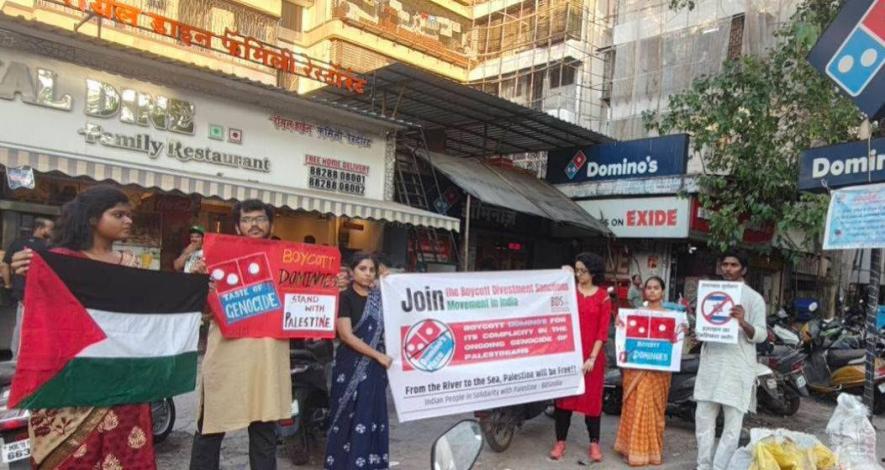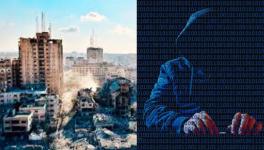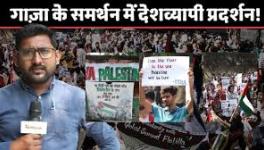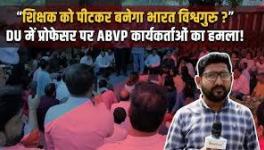A Letter to My Friend in Gaza

Image credit: Facebook/Indian People in Solidarity With Palestine
Dear friend,
I write to you as a student, a young researcher sitting in the library of one of the most ‘vocal’ and ‘prestigious’ institutions, not just in India but in what is construed as the Global South. I sit and stare at my laptop screen, throwing up visuals of Palestinian universities, libraries, and centres of learning being turned into debris; thousands of people bombed, and young children starved to death.
All of this is a part of the ongoing Zionist offensive, which many believe started with Hamas’s October 7 attack on Israel. As a sense of grief and angst overpowers me, I pen down my racing thoughts while thinking of the 1917 Balfour Declaration, the 1947 United Partition Plan, the 1948 Naqba, the subsequent Naksa period, and the Intifada(s), which have historically shaped the Israel-Palestine conflict.
In response to the oft-repeated question: ‘Do you condemn October the 7th?’, many of us readily said ‘yes’. But even after one-and-a-half years of beginning of Israel’s unending offensive on Gaza and killing of more than 66,000 Palestinians since October 2023, many among us still hesitate to say ‘yes’ with similar force in response to another question that is asked seldom in my part of the world: ‘Is Israel committing a genocide and war crimes in Gaza?’
Despite being a former colony and taking pride in the historical anti-colonial struggle, the official position of our ruling government on the ongoing Israeli actions in Gaza remains deeply disappointing, marked by stark duality, dilly-dallying and contradictions to say the least. As I write, Bezalel Smotrich, the Right-wing minister in the Israeli cabinet, whom the Israeli newspaper, Haaretz, calls a ‘war criminal,’ stands on Indian soil and signs a bilateral investment agreement with India.
On another side, India voted in favour of the New York Declaration in the UNGA (United Nations General Assembly) that called for a ‘two state solution’ for peace in the region. Notwithstanding the complexities of such a solution and its unviability in the face of Israel’s inherent expansionist tendencies, nothing exemplifies India’ duality on the conflict better than the simultaneity of these two events.
Till now, India’s stance toward the ongoing conflict in the region could best be described as treading a diplomatic tightrope at a time when the rope itself is in shreds. What exemplifies such a balancing act most obviously is the way in which India abstained from the June 12 UNGA that designated the Israeli actions in Gaza as ‘illegal’ and called for ‘an immediate, unconditional and permanent ceasefire’ between Hamas and Israel.
The disbelief and disappointment over this act of abstention reminds me of Desmond Tutu, the anti-apartheid theologian’s popular words: ‘If you are neutral in situations of injustice, you have chosen the side of the oppressor.’ However, with the welcoming of Smotrich in India despite his open calls for starvation and killings of Palestinians and his severe condemnation by governments in different parts of the world, India has made an open shift in its stance.
My dismay over this act stems from the fact that the Indian state has historically held a strong diplomatic and foreign policy stance as far as the Palestinian question is concerned. Explicating upon the history of India-Palestine relations, the Representative Office of India in Gaza underlines: “In 1988, India became one of the first countries to recognize the Palestinian State” and “has consistently supported, co-sponsored, and voted in favor of UN General Assembly Resolutions on issues regarding securing the right to self-determination of Palestinians.”
With the coming to power of the Hindu Right majoritarian government at the helm of power and the growing political and ideological proximity between Indian and Israeli leaders and power elites, India’s stance towards Palestine seems to be shifting from that of active support for Palestine to neutrality and abstention, leading towards tacit, if not open endorsement of Israeli actions in Gaza.
Additionally, this is not limited to the political silence that comes with balancing acts that India is trying to perform at supranational institutions like the UNGA. There are attempts at deliberately silencing the dissenters who criticise Israeli actions in Gaza and raise slogans for Palestinian liberation on Indian streets.
Since October 2023, there have been several instances of people being charged, assaulted, and silenced by the state agencies for staging pro-Palestine protests and demonstrations across different regions in India. The recent case against Talha Mannan, a former student of Aligarh Muslim University, for raising pro-Palestinian slogans, is another addition to the string of such assaults.
At a time when universities in the West, particularly the United States, were building encampments to pressure their respective institutions and the federal government to divest from Israel’s colonial and genocidal project in Gaza, Indian universities, even the most vocal ones, stayed silent and could not build significant mobilisation and shift the popular opinion in favour of Palestine.
This, however, should not be read as a sign of approval of its governments' shifting foreign policy stances but as an outcome of continuous assaults on the public-funded higher educational institutions, which have made them enter into survival mode -- monetarily and culturally -- and developed a fatigue built on almost a decade of institutional attacks and crushed dissent.
However, with the enhanced strength, relevance, and impact of powers like the Shanghai Cooperation Organisation (SCO) and BRICS, along with the incremental shift in global public opinion and the US’ alienation of India in terms of its tariff policy, there are simmering signs of India’s shifting stance toward the conflict(s) in West Asia. The recent signs of which were seen in India’s signing of a joint statement by SCO members on Israel’s attack on Iran. Perhaps it is already too late for my country and the world to take a stern call to stop this ongoing genocide, being telecast on our screens.
Notwithstanding the reasons or justifications for our collective silence and the nuances of gradually shifting power dynamics, the fact remains that we cannot be absolved for our complicity in the largest ethnic cleansing that this century is witnessing. Despite a hostile socio-political environment that surrounds us for any active support for the Palestinian right to self-determination, I write to you not as an individual but as a community, however small in numbers, that does exist to challenge the collective amnesia and terror of silence. I write to you to register that our voice might be dim, but it isn’t inconsequential. I write to you with rage, solidarity, a deep sense of empathy, and a flickering hope in the moment of utmost despair that no matter how difficult it might look, our collective struggle for a free Palestine will go on. There will be a dawn when ‘From the River to the Sea, Palestine will ultimately be Free!’.
In solidarity,
Khushbu Sharma is pursuing a PhD at Jawaharlal Nehru University, New Delhi. The views are personal.
Get the latest reports & analysis with people's perspective on Protests, movements & deep analytical videos, discussions of the current affairs in your Telegram app. Subscribe to NewsClick's Telegram channel & get Real-Time updates on stories, as they get published on our website.
























